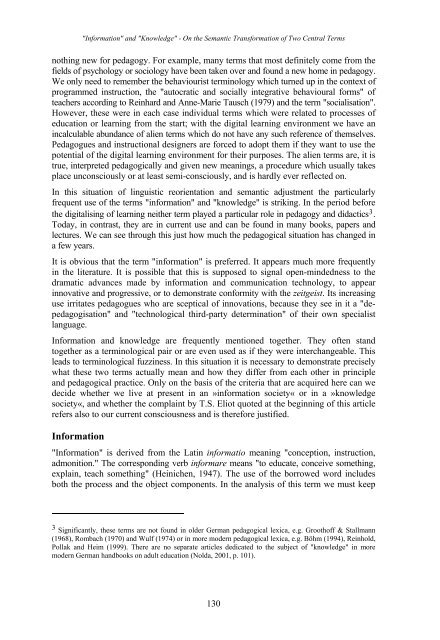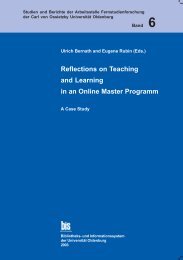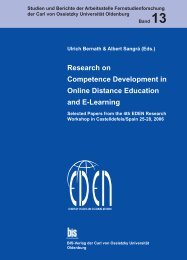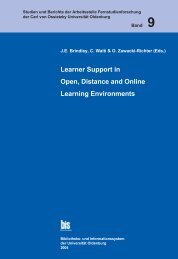Distance Education in Transition - Master of Distance Education ...
Distance Education in Transition - Master of Distance Education ...
Distance Education in Transition - Master of Distance Education ...
You also want an ePaper? Increase the reach of your titles
YUMPU automatically turns print PDFs into web optimized ePapers that Google loves.
"Information" and "Knowledge" - On the Semantic Transformation <strong>of</strong> Two Central Terms<br />
noth<strong>in</strong>g new for pedagogy. For example, many terms that most def<strong>in</strong>itely come from the<br />
fields <strong>of</strong> psychology or sociology have been taken over and found a new home <strong>in</strong> pedagogy.<br />
We only need to remember the behaviourist term<strong>in</strong>ology which turned up <strong>in</strong> the context <strong>of</strong><br />
programmed <strong>in</strong>struction, the "autocratic and socially <strong>in</strong>tegrative behavioural forms" <strong>of</strong><br />
teachers accord<strong>in</strong>g to Re<strong>in</strong>hard and Anne-Marie Tausch (1979) and the term "socialisation".<br />
However, these were <strong>in</strong> each case <strong>in</strong>dividual terms which were related to processes <strong>of</strong><br />
education or learn<strong>in</strong>g from the start; with the digital learn<strong>in</strong>g environment we have an<br />
<strong>in</strong>calculable abundance <strong>of</strong> alien terms which do not have any such reference <strong>of</strong> themselves.<br />
Pedagogues and <strong>in</strong>structional designers are forced to adopt them if they want to use the<br />
potential <strong>of</strong> the digital learn<strong>in</strong>g environment for their purposes. The alien terms are, it is<br />
true, <strong>in</strong>terpreted pedagogically and given new mean<strong>in</strong>gs, a procedure which usually takes<br />
place unconsciously or at least semi-consciously, and is hardly ever reflected on.<br />
In this situation <strong>of</strong> l<strong>in</strong>guistic reorientation and semantic adjustment the particularly<br />
frequent use <strong>of</strong> the terms "<strong>in</strong>formation" and "knowledge" is strik<strong>in</strong>g. In the period before<br />
the digitalis<strong>in</strong>g <strong>of</strong> learn<strong>in</strong>g neither term played a particular role <strong>in</strong> pedagogy and didactics3 .<br />
Today, <strong>in</strong> contrast, they are <strong>in</strong> current use and can be found <strong>in</strong> many books, papers and<br />
lectures. We can see through this just how much the pedagogical situation has changed <strong>in</strong><br />
a few years.<br />
It is obvious that the term "<strong>in</strong>formation" is preferred. It appears much more frequently<br />
<strong>in</strong> the literature. It is possible that this is supposed to signal open-m<strong>in</strong>dedness to the<br />
dramatic advances made by <strong>in</strong>formation and communication technology, to appear<br />
<strong>in</strong>novative and progressive, or to demonstrate conformity with the zeitgeist. Its <strong>in</strong>creas<strong>in</strong>g<br />
use irritates pedagogues who are sceptical <strong>of</strong> <strong>in</strong>novations, because they see <strong>in</strong> it a "depedagogisation"<br />
and "technological third-party determ<strong>in</strong>ation" <strong>of</strong> their own specialist<br />
language.<br />
Information and knowledge are frequently mentioned together. They <strong>of</strong>ten stand<br />
together as a term<strong>in</strong>ological pair or are even used as if they were <strong>in</strong>terchangeable. This<br />
leads to term<strong>in</strong>ological fuzz<strong>in</strong>ess. In this situation it is necessary to demonstrate precisely<br />
what these two terms actually mean and how they differ from each other <strong>in</strong> pr<strong>in</strong>ciple<br />
and pedagogical practice. Only on the basis <strong>of</strong> the criteria that are acquired here can we<br />
decide whether we live at present <strong>in</strong> an »<strong>in</strong>formation society« or <strong>in</strong> a »knowledge<br />
society«, and whether the compla<strong>in</strong>t by T.S. Eliot quoted at the beg<strong>in</strong>n<strong>in</strong>g <strong>of</strong> this article<br />
refers also to our current consciousness and is therefore justified.<br />
Information<br />
"Information" is derived from the Lat<strong>in</strong> <strong>in</strong>formatio mean<strong>in</strong>g "conception, <strong>in</strong>struction,<br />
admonition." The correspond<strong>in</strong>g verb <strong>in</strong>formare means "to educate, conceive someth<strong>in</strong>g,<br />
expla<strong>in</strong>, teach someth<strong>in</strong>g" (He<strong>in</strong>ichen, 1947). The use <strong>of</strong> the borrowed word <strong>in</strong>cludes<br />
both the process and the object components. In the analysis <strong>of</strong> this term we must keep<br />
3 Significantly, these terms are not found <strong>in</strong> older German pedagogical lexica, e.g. Grooth<strong>of</strong>f & Stallmann<br />
(1968), Rombach (1970) and Wulf (1974) or <strong>in</strong> more modern pedagogical lexica, e.g. Böhm (1994), Re<strong>in</strong>hold,<br />
Pollak and Heim (1999). There are no separate articles dedicated to the subject <strong>of</strong> "knowledge" <strong>in</strong> more<br />
modern German handbooks on adult education (Nolda, 2001, p. 101).<br />
130





